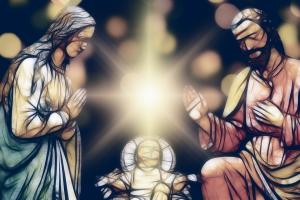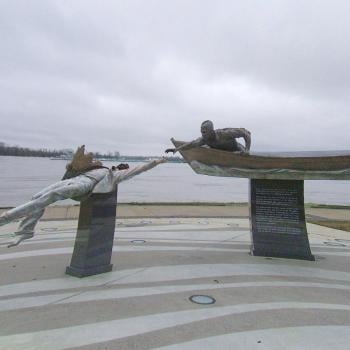
It was the calm in the midst of the storm.
That’s how historians describe the truce that took place in the early hours of Christmas Day, in 1914. Europe was five months into a war, the likes of which had never been seen. And although then-Pope Benedict XV had recommended that the warring nations call a cease-fire in this first World War in order to celebrate Christ’s birth, no such official act was to take place.
But letters and other accounts from soldiers would later describe what did take place: At places along the western front in the early hours of Christmas morning, the sounds of gunfire gave way to the sounds of Christmas carols rising over the trenches. The troops, in turn, sang carols across the trenches in their native languages. And at some point, British and German soldiers heard themselves singing the same carol, each in their own languages, and they began singing together.
As the soldiers began singing together, fear and suspicion grew; each side feared that the other – the enemy – might be planning to ensnare them in a trap. But as the men began to emerge from the trenches, unarmed, they began surrendering their fears and trusting one other.
On that incredible Christmas Day, the Allied troops and the troops of the Central Forces began crossing the literal and figurative chasm between them to greet one another; they exchanged their meager rations as gifts, reportedly even engaged in a friendly game of soccer, and began claiming the bodies of comrades fallen in the no-man’s land between them for burial.
Soldiers found those hours of peace to be a Christmas miracle; it was an unprecedented – albeit a short-lived and not-to-be-repeated – gift in a war that would take over 17 million lives before its end. But for that one day, when troops from both the Allied forces and the Central Powers surrendered their fears, they were able to see the humanity in one another, and there was peace.
When we approach one another with fear and mistrust, when we view one another as enemies, it’s hard for us to see the humanity in one another – and it’s even harder for us to imagine peace.
Two thousand years ago, when angels announced the birth of the long-promised Messiah to shepherds who were in the fields with their sheep, they greeted the shepherds with these words: “Do not be afraid.”
There was much packed into that message: Do not be afraid of what you are seeing and hearing right now. This message really is for you, and for all people. Do not be afraid of what is to come: God living among you will not look like anything that you’ve seen or experienced before; the sick will be made well, the blind will see, the deaf will hear, the lame will walk. Do not be afraid to share this good news with all of your neighbors; God has called you as messengers to deliver this news of hope that will sustain your people in these difficult days.
And so the shepherds surrendered their fears and went to find this child, this child who was light in the darkness, this child who was hope in the midst of hopelessness, this child who brought life in the midst of death and destruction. And they shared the good news. And it would come to pass that throngs of people who lived in the oppressive world of the Roman Empire would make their way to the light of Jesus. They followed him to hear his teaching; they followed him to receive the healing that could only come from him. They put aside their fears long enough to realize that one touch from Jesus meant that they would never be the same.
The angels’ message is a message to us, too: Do not be afraid.
Do not be afraid of the message of God’s love – a message of love so great that God would send God’s own Son to live among us as an incarnate example of God’s incredible love for us. Do not be afraid to surrender to and be transformed by the power of God’s love. Do not be afraid to find the places where our voices blend in shared humanity – and sing together a song of peace and goodwill. Do not be afraid to cross the literal and figurative divide between us as we call for our own truce: a truce calling an end to injustice and hatred, a truce calling an end to violence, a truce calling an end to oppression and human-trafficking, a truce ending poverty and homelessness.
Right now, we need a truce calling an end anything and everything that does not result in our responding to one another as children of God, made in God’s image and likeness.
Putting down our “weapons,” emerging from our trenches and crossing the divide between us as we learn to make joyful, peace-filled noise together no doubt will be frightening. We may fear that the “enemy” plans to ensnare us in a trap. But the precious glimpses of shared humanity we find in coming together will help us make our way to a truce, to peace.
Only, once we have declared a truce, let’s make it permanent. Let’s not let the truce slip away as we return to battle against one another. For it is in the truce, for it is in the peace, that we find God’s Kingdom come.

















